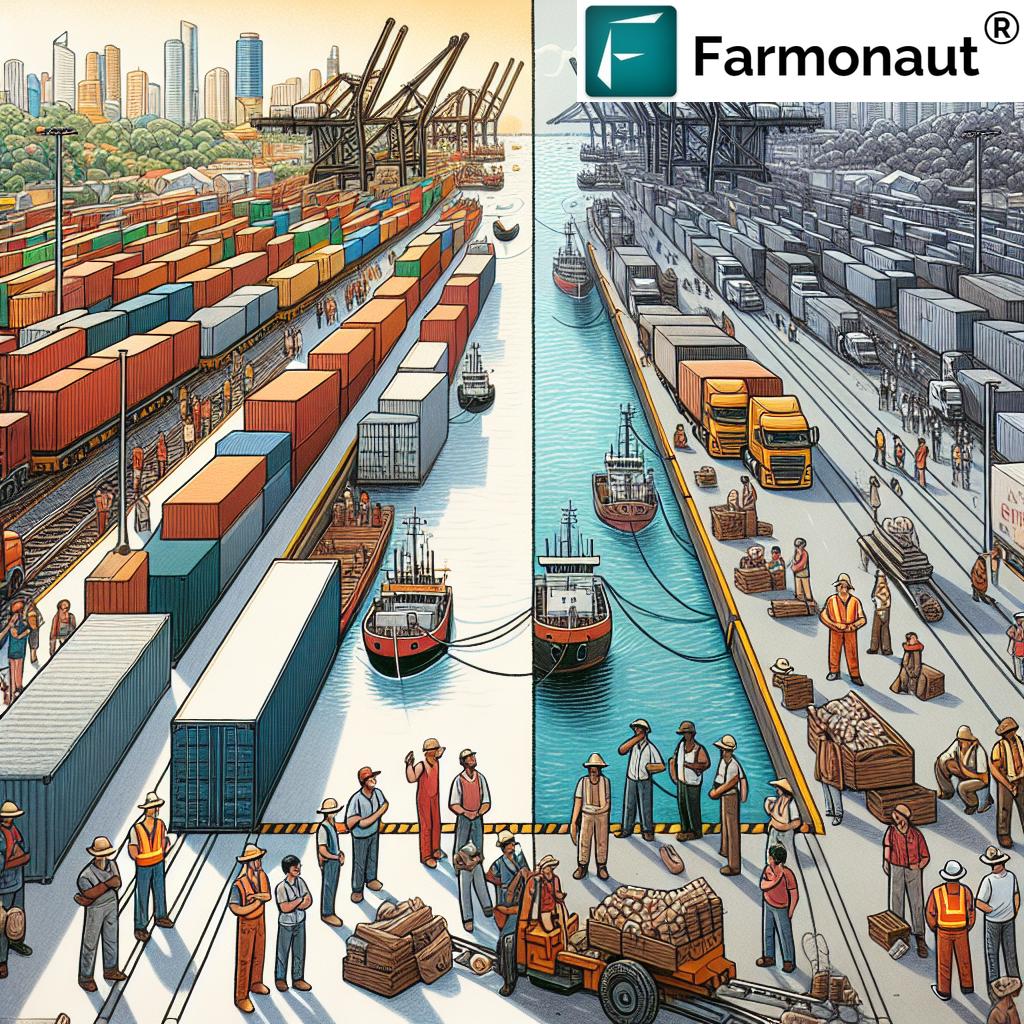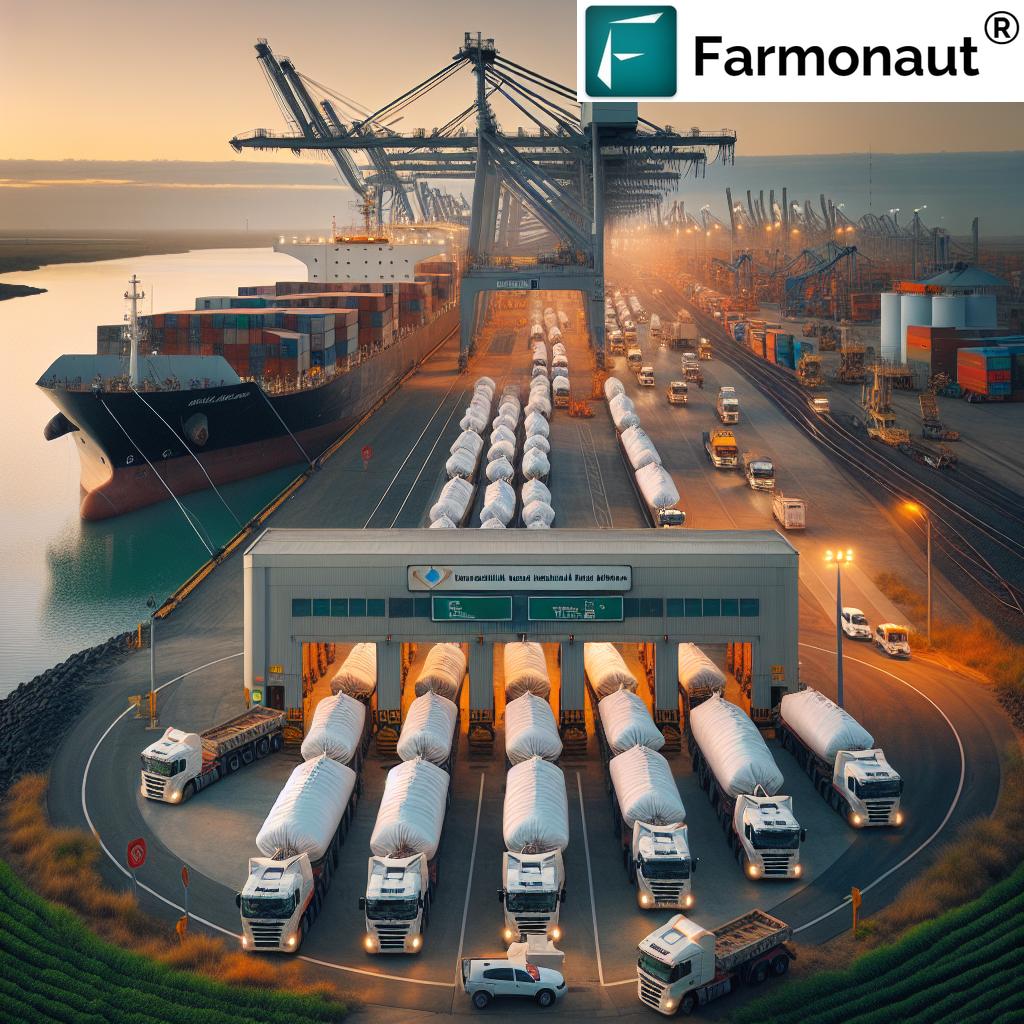Australian Port Strikes: Economic Impact and Supply Chain Disruptions in Shipping Industry
“Australian port strikes have impacted operations at 3 major ports: Melbourne, Brisbane, and Fremantle, causing nationwide economic disruptions.”
We are witnessing a critical moment in Australia’s industrial and economic landscape as port strikes continue to ripple through the nation’s supply chains, causing significant disruptions to shipping operations and international trade. In this comprehensive analysis, we’ll delve into the far-reaching consequences of these industrial actions on various sectors of the Australian economy and explore the urgent calls for resolution.
The Current State of Australian Port Strikes
The ongoing industrial action against Qube Ports has escalated into a crisis that threatens to undermine Australia’s position in global trade. Shipping Australia (SA) has taken the unprecedented step of urging government intervention, highlighting the severe economic implications for the nation. Let’s break down the current situation:
- Industrial actions are either underway or scheduled at several key ports, including Brisbane, Port Kembla, Melbourne, Adelaide, Darwin, and Fremantle.
- A particularly concerning 14-day strike is set to occur in Melbourne, one of Australia’s busiest ports.
- These strikes follow months of negotiations between the Maritime Union of Australia (MUA) and port operators, which stalled after the expiration of the previous employment agreement in June last year.
The gravity of the situation has prompted Shipping Australia to reach out to the Federal Minister for Employment and Workplace Relations, Murray Watt, requesting the use of Fair Work Act powers to terminate the strikes and have the dispute resolved through the Fair Work Commission (FWC).

Economic Ramifications of the Port Strikes
The economic impact of these strikes is both profound and multifaceted. We’re observing disruptions that extend far beyond the immediate vicinity of the ports, affecting industries across the board and threatening Australia’s reputation as a reliable trading partner.
Shipping and Logistics Sector
The shipping and logistics sector is at the epicenter of this crisis. Here’s how the strikes are affecting operations:
- Port congestion has led to significant delays in import and export operations.
- Car carriers are experiencing delays in discharging vehicles, resulting in offloading at incorrect ports and costly transport across Australia.
- Bulk commodities are facing severe handling issues, particularly in Darwin, Fremantle, and Melbourne.
These disruptions are not just inconveniences; they represent real economic losses and potential long-term damage to Australia’s trade relationships.
Agricultural Sector
The agricultural sector, a cornerstone of Australia’s economy, is feeling the strain of these port strikes. Farmers are particularly vulnerable to the following issues:
- Delays in accessing imported fertilizers and machinery, crucial for planting and harvesting seasons.
- Difficulties in exporting grains and other bulk commodities, potentially leading to lost market opportunities and decreased revenues.
- Increased costs due to alternative shipping arrangements and extended storage requirements.
Paul Zalai, director of the Freight & Trade Alliance (FTA) and secretariat of the Australian Peak Shippers Association (APSA), emphasizes the negative ramifications for regional communities that heavily rely on timely agricultural operations.
Mining Sector
Australia’s mining industry, another pillar of the national economy, is not immune to the effects of the port strikes:
- Unpredicted delays in receiving essential equipment are hampering mining operations.
- Export delays for mineral resources could lead to breaches of international contracts and loss of market share to competitors.
- Increased costs associated with storage and alternative shipping arrangements are eating into profit margins.
Construction Industry
The construction sector is grappling with supply chain issues that are exacerbating existing challenges:
- Shortages of imported steel and bulk cement are causing project delays.
- The inability to meet housing demand is further strained by these supply chain disruptions.
- Increased costs of materials due to shipping delays are impacting project budgets and housing affordability.
“The ongoing industrial action affects multiple sectors, including agriculture, mining, and construction, threatening Australia’s international trade relationships.”
The Role of Government and Industrial Relations
The current crisis has sparked intense debate about the role of government in industrial disputes and the need for reforms to the Fair Work Act. Key points of discussion include:
- Calls for government intervention to resolve the dispute and minimize economic damage.
- Proposals for reforms to streamline negotiation and arbitration processes in essential industries.
- The balance between protecting workers’ rights and ensuring the unimpeded flow of trade.
Shipping Australia and other industry bodies are urging State and Territory Ministers to act swiftly on behalf of Australian families to mitigate the adverse impact of the strikes.
Long-Term Implications for Australian Trade
The prolonged nature of these port strikes raises concerns about long-term implications for Australian trade:
- Potential loss of market share in key export commodities as international buyers seek more reliable suppliers.
- Damage to Australia’s reputation as a dependable trading partner, which could take years to rebuild.
- Increased costs for Australian businesses and consumers due to supply chain inefficiencies and alternative shipping arrangements.
These factors underscore the urgency of finding a resolution to the current industrial dispute.

The Need for Supply Chain Resilience
The current crisis highlights the vulnerability of Australia’s supply chains and the need for greater resilience. We’re seeing increased interest in:
- Diversification of shipping routes and port usage to reduce dependence on specific facilities.
- Investment in domestic manufacturing and processing capabilities to reduce reliance on imports.
- Adoption of advanced technologies to improve supply chain visibility and management.
In this context, innovative solutions like those offered by Farmonaut become increasingly relevant. While Farmonaut’s primary focus is on agricultural technology, its principles of data-driven decision-making and resource optimization can be applied to broader supply chain management challenges.
Economic Impact of Australian Port Strikes
| Sector | Estimated Daily Loss (AUD) | Supply Chain Disruption Level (1-5) | Key Commodities Affected |
|---|---|---|---|
| Agriculture | $15 million | 4 | Grains, Fertilizers, Machinery |
| Mining | $25 million | 4 | Iron Ore, Coal, Mining Equipment |
| Construction | $10 million | 3 | Steel, Cement, Heavy Machinery |
| Automotive | $8 million | 3 | Vehicles, Auto Parts |
| Retail | $12 million | 2 | Consumer Goods, Electronics |
| Total | $70 million | 3.2 (Average) | Multiple |
This table provides a stark illustration of the daily economic toll the port strikes are exacting on various sectors of the Australian economy. The ripple effects of these disruptions are felt across the nation, impacting not just businesses but also Australian families and communities.
The Role of Technology in Mitigating Supply Chain Disruptions
As we grapple with the challenges posed by the port strikes, it’s clear that technology will play a crucial role in building more resilient supply chains. While Farmonaut’s focus is on agricultural technology, its approach to data-driven decision-making offers valuable insights for broader supply chain management:
- Real-time monitoring and analytics can help businesses anticipate and respond to supply chain disruptions more effectively.
- AI-driven advisory systems, similar to Farmonaut’s Jeevn AI, could be adapted to provide insights on optimal shipping routes and logistics planning.
- Blockchain-based traceability solutions could enhance transparency and efficiency in international trade operations.
For those interested in exploring how technology can drive efficiency in their operations, consider checking out Farmonaut’s offerings:
For developers interested in integrating satellite and weather data into their own systems, Farmonaut offers an API with comprehensive developer documentation.
The Way Forward: Balancing Industrial Relations and Economic Stability
As we look to resolve the current crisis and prevent future disruptions, several key considerations emerge:
- The need for a more agile and responsive industrial relations framework that can quickly address disputes in critical sectors.
- The importance of ongoing dialogue between unions, employers, and government to preempt potential conflicts.
- Investment in port infrastructure and technology to increase efficiency and reduce vulnerability to disruptions.
- Development of comprehensive contingency plans for managing supply chain crises.
These steps are crucial not only for resolving the current situation but also for ensuring Australia’s long-term economic stability and competitiveness in the global market.
Conclusion: A Call for Collaborative Action
The Australian port strikes serve as a stark reminder of the interconnectedness of our economy and the far-reaching consequences of industrial disputes. As we’ve explored, the impacts extend far beyond the docks, affecting farmers, miners, builders, and ultimately, every Australian consumer.
The resolution of this crisis will require a concerted effort from all stakeholders – unions, employers, government, and industry bodies. It’s crucial that we find a balance between protecting workers’ rights and ensuring the smooth flow of trade that underpins our national prosperity.
As we move forward, let’s embrace innovative solutions and technologies that can help build more resilient supply chains. While the challenges are significant, they also present an opportunity to reimagine and strengthen Australia’s position in the global trading system.
We invite our readers to stay informed on this crucial issue and to engage in constructive dialogue about the future of Australia’s industrial relations and trade policies. Together, we can work towards a more stable, efficient, and prosperous future for all Australians.
FAQ Section
Q1: How long have the current port strikes been ongoing?
A1: The current wave of industrial action follows months of negotiations after the expiration of the previous employment agreement in June of last year.
Q2: Which ports are most affected by the strikes?
A2: The main ports affected include Melbourne, Brisbane, Fremantle, Port Kembla, Adelaide, and Darwin.
Q3: What are the main demands of the striking workers?
A3: While specific demands may vary, the strikes generally revolve around negotiations for a new employment agreement with improved working conditions and wages.
Q4: How are these strikes affecting everyday Australians?
A4: Everyday Australians may experience increased prices for goods, delays in receiving imported products, and potential job insecurity in industries affected by trade disruptions.
Q5: What steps is the government taking to resolve the dispute?
A5: The government is being urged to intervene using powers under the Fair Work Act and to facilitate resolution through the Fair Work Commission.
Earn With Farmonaut
Earn 20% recurring commission with Farmonaut’s affiliate program by sharing your promo code and helping farmers save 10%. Onboard 10 Elite farmers monthly to earn a minimum of $148,000 annually—start now and grow your income!
For more information on how you can participate in this program, visit Farmonaut’s Affiliate Program.
Farmonaut Subscriptions

















